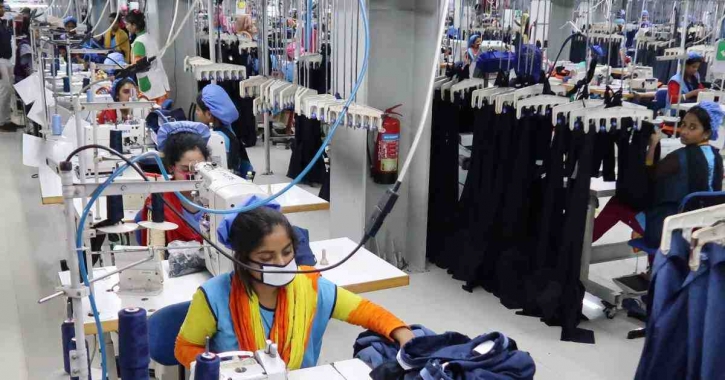Plans afoot to transform Bangladesh’s economy in view of LDC graduation
UNB || BusinessInsider

Workers are seen sewing clothes at garment factory. Representational photo/UNB
The government has taken structural transformation of the economy as a priority agenda for the coming days to maintain its position among the developing countries and become a higher middle-income country by 2031 defying all the hurdles of the post-LDC era.
"We, therefore, need to accelerate this structural transformation of the economy," the government said in an official budget document.
To this end, the government will provide necessary financial assistance for the implementation of some activities.
These are-- mechanisation of agriculture, development of the agro- processing sector, skill development and productivity enhancement, and expansion of training and education related to 4th Industrial Revolution.
The government will also provide necessary financial assistance for encouragement of online based outsourcing work, self- employment/creation of new entrepreneurs, and encouragement of basic and practical research at the university level.
It said that the country has been gradually moving from an agro-based economy to a manufacturing-based economy following the pursuit of effective government policies and strategies during the last 12 years.
Therefore, the document said, the contribution of agriculture to the GDP has been gradually declining and the desired structural transformation is taking place in the economy.
It mentioned that Bangladesh has already qualified for graduation from a least developed country to a developing country.
"To maintain its position among the developing countries and become a higher middle income country by 2031, we need a strong industrial and manufacturing sector, which will help sustain high economic growth."
According to the United Nations Committee for Development Policy (UNCDP) recommendation, Bangladesh's transition will be effective in 2026. It means until 2026, Bangladesh will be able to enjoy all the benefits applicable to LDCs.
However, under the current rules, Bangladesh will be able to enjoy duty-free and quota-free market access for another three years, until 2029, after entering the EU market.
Meanwhile, the government is preparing a detailed action plan for supporting the country's export competitiveness to maintain its position in the world market as well as improving further in the post-LDC era.
The plan, which is being prepared by the Economic Relations Division, will incorporate all necessary strategies in the 8th Five Year Plan for the purpose.
Bangladesh will have at least five years to deal with the challenges of transitioning from a least developed country to a developing country.
The UNCDP upon the request of the government has recommended that against the backdrop of COVID-19 pandemic, the preparation period for the transition will be five years instead of three. During this period, that is, until 2026, all international facilities will continue.
The LDC Group of the World Trade Organization (WTO) has put forward a proposal to ensure that all trade facilities pertaining to LDCs remain in force for another 12 years after transition.
Bangladesh has actively participated in this process, and is continuing its efforts to get this proposal accepted.
The document said that the government has already taken steps to avail the advantages of GSP+ in EU countries after the graduation.
Meanwhile, the government has taken various steps to address the challenges that Bangladesh will face as a result of its graduation from an LDC.
The government has taken multiple steps to increase the overall competitiveness of the country's trade and commerce to survive in the international market by competing with products from other countries.
Moreover, the government has taken effective steps to improve its ranking in the Ease of Doing Business Index to increase the flow of foreign direct investment (FDI).
The benefits of these steps are becoming evident, the document reads.
























